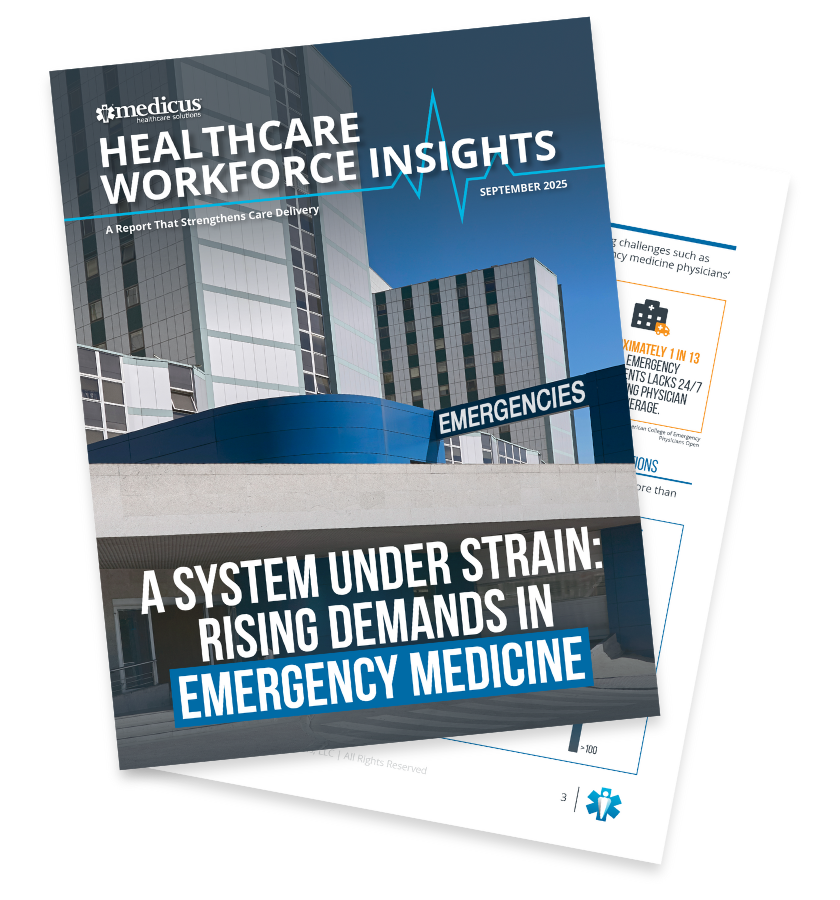A System Under Strain: Rising Demands in Emergency Medicine

In the emergency department (ED), where every second counts, rising challenges such as overcrowding and increased ED boarding times are straining emergency medicine physicians' ability to deliver timely care.
Download the Complete Report for Insights into the Rising Demands for Emergency Care

Emergency Medicine by the Numbers: Workforce & Job Growth Projections
There are over 66,000 emergency medicine physicians in the United States, with more than 2,700 specializing in pediatric emergency medicine.

Emergency Medicine Locum Tenens: A Look at the Interim Workforce
Among the emergency medicine workforce, more than 10,000 have worked locum tenens either alongside their permanent role or as a standalone career. 
Among the top five physician searches using locum tenens, emergency medicine accounted for 17% of all searches, making it the second most searched specialty. This placed emergency medicine just behind anesthesia, underscoring the growing demand for emergency care coverage.
ED Boarding: A Consistent Systemwide Challenge
As visits to the emergency department continue to rise, prolonged ED boarding is becoming a persistent challenge. According to a study published in Health Affairs:
Key Drivers: Factors Behind the Increasing Demand for Emergency Medicine
Residency Training: Geographic Correlations in Practice
According to the Association of American Medical Colleges, more than half of individuals who complete residency go on to practice within the same state they were trained. While residency location does not directly determine workforce distribution, it suggests a correlation between the presence of residency programs and local physician supply.
Burnout: High Prevalence in Emergency Medicine
Emergency medicine has consistently ranked among the most burned-out medical specialties over the past five years..png?width=800&height=216&name=Burnout%20Rates%20among%20Emergency%20Medicine%20Physicians%20(2022-2025).png)
Despite a decline in the percentage of emergency medicine physicians reporting burnout since its 2021 peak, prevalence remains high. Consistent burnout can contribute to reduced job satisfaction and increased turnover, placing additional pressure on already strained emergency departments.
Actionable Approaches: Strategies for Navigating the Rising Demands for Emergency Care
Optimize Workforce Management: Aligning Staffing & Resources
Targeted staffing strategies, efficient triage processes, and balanced workloads are crucial for maintaining both high-quality patient care and clinician well-being.
A proactive, data-driven workforce strategy not only improves patient flow and operational efficiency but also reinforces team resilience, positioning emergency departments to deliver consistent, high-quality care in the face of rising ED demand.
Utilize Emergency Medicine Locum Tenens: Bridging Gaps in Coverage
As the demands on emergency medicine physicians persist, leveraging and implementing locum tenens can be a vital strategy in ensuring timely access to emergent care.
Utilizing emergency medicine locum tenens while partnering with a trusted interim healthcare staffing agency, such as Medicus, ensures reliable coverage and support. By managing the complexities of locum tenens staffing, Medicus provides the necessary resources and expertise needed to help maintain continuity of care while minimizing the strain on permanent teams.
For a comprehensive look into the factors driving the demand for emergency care and strategies for ensuring continuous access, we invite you to download our complete white paper by filling out the form above.
Frequently Asked Questions About the Rising Demands in Emergency Medicine
How Many Emergency Medicine Physicians are in the United States?
There are over 66,000 emergency medicine physicians in the United States, with over 2,700 specializing in pediatric emergency medicine.
How Many Emergency Medicine Physicians Work Locum Tenens in the U.S.?
Based on Medicus' proprietary data, as of August 2025, approximately 15% of the emergency medicine workforce has worked locum tenens.
What is Driving the Increasing Demand for Emergent Care?
A combination of factors is fueling the growing demand for emergency care, including regional gaps in residency training, heightened clinical acuity, burnout, increasing patient volumes, and other factors.
Is ED Boarding Worse than Before the Pandemic?
A study published in Health Affairs found that prior to the pandemic, fewer than 5% of patients waited more than 12 hours for a bed, even during peak times. Today, it rarely goes below 5% even at the lowest times of the year.
What States Have the Fewest Emergency Medicine Physicians Per Capita?
The states with the lowest number of emergency medicine physicians per capita include Nebraska, Alabama, Kansas, Iowa, and North Dakota.



.jpg)

